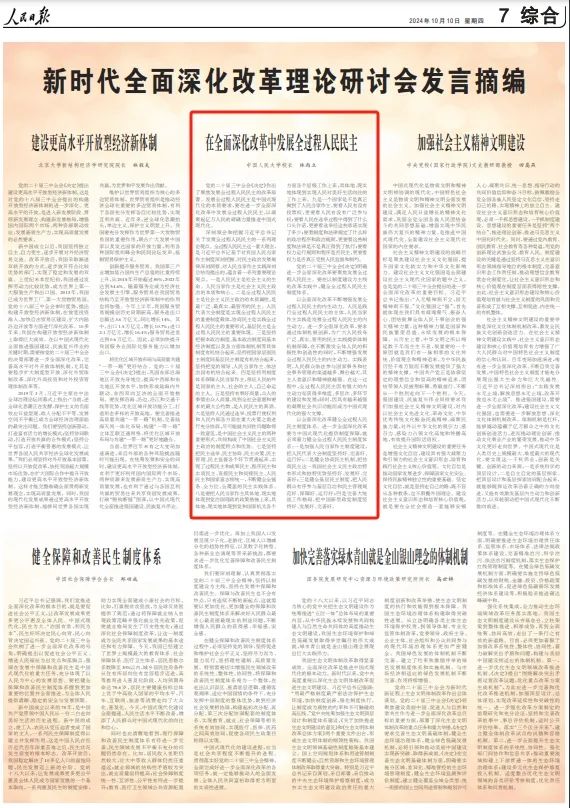 Research Update
Research Update
21
Oct
Key points abstracted from the Speech by Lin Shangli, President of Renmin University of China and Dean of the National Academy of Development and Strategy, at the Theoretical Seminar on Comprehensively Deepening Reform in the New Era:
The Decision of the Third Plenary Session of the 20th Central Committee of the Communist Party of China (CPC) made reform arrangements focusing on the development of whole-process people’s democracy. The development of whole-process people’s democracy is an essential requirement of Chinese modernization. It is necessary to advance the development of whole-process people’s democracy through further comprehensive deepening of reforms, thereby mobilizing the immense power of the people to propel Chinese modernization.
Deeply understand and grasp a series of theoretical viewpoints from President Xi Jinping on the development of whole-process people's democracy. The significant concept of whole-process people’s democracy was proposed by General Secretary Xi Jinping based on a profound understanding of our country’s system of the people as masters of the country, a deep insight into the development rules of democratic politics, and a thorough summary of the practice of the people as masters of the country. It embodies a series of important theoretical viewpoints:
1. People’s democracy is the life of socialism. The people being masters of the country is the essence and core of socialist democratic politics.
2. Whole-process people's democracy is the essential attribute of socialist democratic politics. It is the broadest, most genuine, and most effective democracy. The system of people’s congresses is an important institutional vehicle for realizing whole-process people’s democracy. Consultative democracy is an important form of practicing whole-process people’s democracy, and grassroots democracy is a crucial manifestation of it.
3. Persist in organically combining the fundamental political system, basic political systems, and various specific systems, including economic systems and mechanisms. Integrate national-level democratic systems with grassroots democratic systems, and integrate the Party’s leadership, the people as masters of the country, and rule of law.
4. Use a systematic framework to ensure the people are masters of the country, ensuring that the people remain the masters of the state, society, and their own destiny.
5. Uphold the principle that discussions lead to consensus. The essence of people’s democracy is that matters of public concern should be discussed by everyone, to find the greatest common denominator of societal will and demands.
6. Ensure that the people exercise their rights through elections and voting, and that they engage in extensive consultations within the community before major decisions are made. Reaching as much consensus as possible on common issues is an important feature of China’s socialist democracy, comprising its institutional characteristics and advantages.
7. Connect democratic elections, consultations, decision-making, management, and supervision, achieving a unity of process democracy and outcome democracy, procedural democracy and substantive democracy, direct democracy and indirect democracy, the people’s democracy and the state’s will. This continually improves a comprehensive, multi-dimensional, and all-encompassing democratic practice system.
8. Ensure that the people’s role as masters of the country is concretely and realistically reflected in the Party's governance policies, in the operations of Party and state institutions at all levels, and in efforts to meet the people's aspirations for a better life.
9. To determine whether a country has truly achieved the people being masters of the country, we must examine not only whether the people have the right to vote but also whether they have broad participation rights. We must look at what verbal promises were made during the election process and, more importantly, how many of those promises were fulfilled afterward. We must examine the political procedures and rules set by laws and systems and, more importantly, whether they are actually implemented. We must evaluate whether the rules and procedures for the operation of power are democratic and, more importantly, whether power is genuinely subject to the supervision and restraint of the people.
The Decision of the Third Plenary Session of the 20th CPC Central Committee clarified that further comprehensive deepening of reforms should focus on developing whole-process people’s democracy. Reform practices must be driven by institutional construction to improve the system of whole-process people’s democracy.
Strengthen the internal driving force for the development of whole-process people’s democracy through comprehensive deepening of reforms. The people are the main practitioners of whole-process people’s democracy, and the practice of the people being masters of the country is the internal driving force for its development. Further comprehensive deepening of reforms requires innovations in systems and mechanisms to ensure that the broad masses of people can participate in extensive, genuine, and effective democratic practices, while continuously enhancing the internal driving force for the development of whole-process people’s democracy. Practice has shown that the more channels and opportunities people have to legally participate in the management of state and social affairs, the stronger their sense of ownership and spirit. In this process, whole-process people's democracy will develop multi-dimensionally and at multiple levels and stages due to its strong internal driving force. Simultaneously, as it becomes more effective in uniting societal consensus, it will serve as a powerful support for Chinese modernization.
Improve the system of whole-process people’s democracy through comprehensive deepening of reforms. To provide institutional guarantees for Chinese modernization, further comprehensive deepening of reforms must focus on improving the system of whole-process people’s democracy: First, strengthen the institutional construction for the people being masters of the country, ensuring that the system of people’s congresses is upheld, improved, and well-functioning. Second, improve consultative democracy mechanisms, ensuring that this unique form and advantage of socialist democratic politics is upheld, developed, and perfected. Third, strengthen the system of grassroots democracy, ensuring that the people can participate in grassroots self-governance and democratic management in an orderly manner. Fourth, improve the overall framework of the United Front work, ensuring that China’s new party system is upheld, developed, and perfected.
(Translated by ZHANG Yuqing; Proofread by YANG Fanxin)